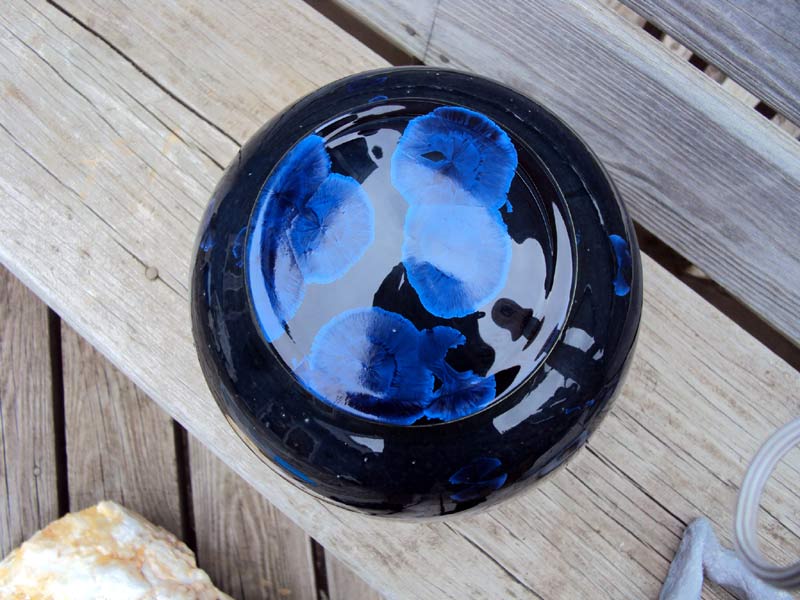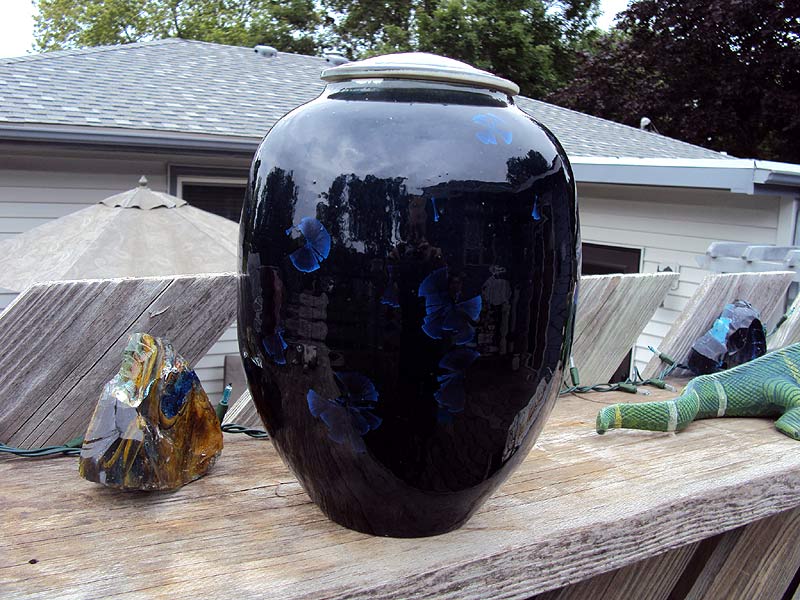|
Dialogue
on Glaze Thickness
with
Mike Oliver
Home
|
Zinc Silicate Crystalline Glaze Pottery
A chronicle of my recent
progress and a way for me to keep it straight in my head!
|
From:
Michael Oliver
Sent: Sunday, June 26, 2011 11:21 PM
To: pdh-at-zircarceramics.com
Subject: Glaze loading
|
Phil,
I recently fired the urn pictured in the
attachments. The lid looks nice and had
one barely wet coat. The body has sparse
and disappointingly small crystals for the hold
time and I'm wondering if I got the glaze on too
thick. The glaze is a 3,3,3 blue black
3110 base and if my calculations are correct I
probably have 1g. per cu. in. on the pot.
It's the first time I have ever tried
calculating the glaze loading so I don't have
any bench marks. In looking at the numbers
from your display that was made for Tampa it
looks like I have too much glaze on the pots and
it's inhibiting my crystal growth. Does
that sound right to you?
Mike

|

From: Phil Hamling [mailto:pdh-at-zircarceramics.com]
Sent: Monday, June 27, 2011 9:02 AM
To: Michael Oliver
Cc: _PDH @ home
Subject: FW: Glaze loading
Mike,
This is exactly the type of thing that got me looking closely at
glaze loading. I found similar things happening. I suggest you do a study of
horizontal pieces with a range of glaze loadings and a firing schedule with ups
and downs so you can determine at which point the crystals nucleate and how they
grow at different loadings and temperatures.
Each glaze is truly different but I think you will get the sense
that:
1) As thickness (or loading) increases the nucleation rate
decreases.
2) Growth rate can have a bimodal relationship relative to
thickness, meaning that at a "normal temperature" glazes will exhibit a given
growth rate, but as you increase, or decrease, the thickness the rate will
increase. I've also seen that some glazes exhibit much faster growth at very low
loadings.
Keep in mind that the rate of temperature change can impact
nucleation. Generally fast changes cause nucleation.
Phil
From:
Michael Oliver [mailto:oliverpiano-at-yahoo.com]
Sent: Monday, June 27, 2011 11:50 AM
To: Phil Hamling
Subject: Re: FW: Glaze loading
Thanks Phil,
The pot in the pictures was to be an urn for a friend. It turns out that at 340
cu. in. it's too small anyway and I will have to fire the second one that I made
that will hold 460 bisqued.
I'm trying to make an educated guess without much education as to glaze
adjustment for the body of the 2nd one. I'm thinking of adding 1/2 g. zinc
since I forgot I had been doing that with this base when I mixed the glaze
from memory instead of notes and also lower the glaze loading to about 0.70 from
1.00g/sq.in. Does this sound like a reasonable plan to you?
Mike
From: Phil Hamling [mailto:pdh-at-zircarceramics.com]
Sent: Monday, June 27, 2011 12:33 PM
To: 'Michael Oliver'
Cc: _PDH @ home
Subject: RE: FW: Glaze loading
Mike,
I'm glad to help.
Plan B sounds like too much of a butt pull for my liking. I'd
hate to say yes or no and see it come out like poop. I've always been one to
test, test then test some more so you have that 6 sigma confidence level before
diving in head first.
But…..if a butt pull is in order…..I would guess more zinc would
give you more crystals, as would putting it on thinner. Will it give you what
you are looking for? Maybe. Maybe not. Hence the testing.
Phil
From:
Michael Oliver [mailto:oliverpiano@yahoo.com]
Sent: Monday, June 27, 2011 2:41 PM
To: Phil Hamling
Subject: RE: FW: Glaze loading
Thanks Phil,
Actually everyone but me thought the one in the picture was beautiful, so I'll
try plan B and since I have bad feelings about how the pot will do in the firing
(thrown in two sections) and I have a few small pots to test with I'll also try
just adding the zinc and just less glaze so if I have to throw another I should
have some idea.
Remember even Spock had to make a guess one time on Star Treck. He wasn't
very comfortable with it though.
Mike
Return to
Main Page
Phil Hamling
376
County Route 1
Warwick, NY, USA 10990

